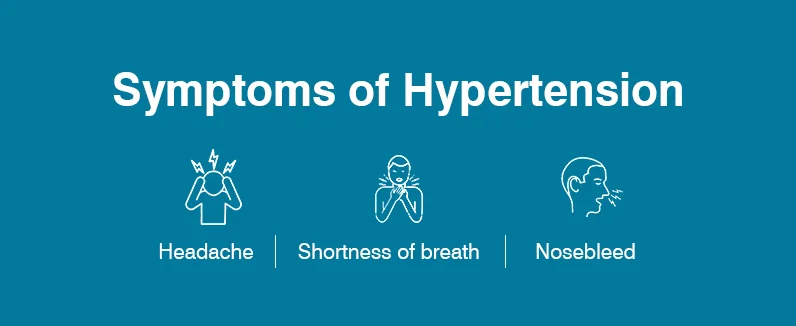Symptoms of Hypertension
Hypertension is a condition that is often associated with few to no symptoms. This makes Hypertension a more dangerous condition as it worsens with the passage of time if not treated properly, while the absence of any symptoms makes for an increased difficulty in the treatment of Hypertension.
It is recommended that you consult an expert in case you notice the following symptoms of Hypertension:
- Headaches
- Shortness of breath
- Nosebleeds
- Abnormal heartbeat
- Chest pain
- Blurred vision
- Fatigue
- Feeling confused
However, these symptoms are not specific and may occur as a result of some other underlying health conditions as well. The symptoms usually do not occur unless the patient’s blood pressure reaches dangerously high levels. Hypertension can impact the circulation causing pain in the legs, can affect the eyes, leading to vision loss and can also impair the function of the kidneys, causing fluid retention and even kidney failure in severe cases.
Some other symptoms that may be indirectly related to hypertension-
- Dizziness
- Facial flushing- feelings of warmth and rapid reddening of your face
- Blood spots in the eyes
When to see an expert
It is important to regularly consult your doctor if you are suffering from Hypertension. The condition is usually detected in the course of your regular check-up sessions with your doctor.
In case you have a family history of Hypertension it is important that you walk in for a blood pressure reading at least every two years, starting from the age of 18 years. For patients of Hypertension who are over 40 years of age, it is recommended that you ask your doctor for blood pressure monitoring procedures at least once a year.
Some key details to keep in mind about Hypertension
- Hypertension causes the patient’s blood pressure to rise above 140 over 90 mm of mercury.
- If left untreated over longer periods of time, Hypertension may lead to a heart attack or even a brain stroke, as well as several other complications.
- Management of lifestyle factors is the most effective way to address the problem of Hypertension.

